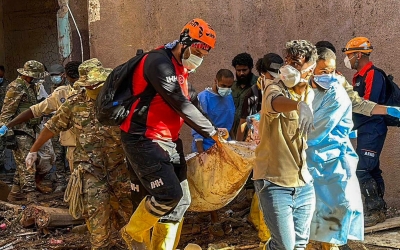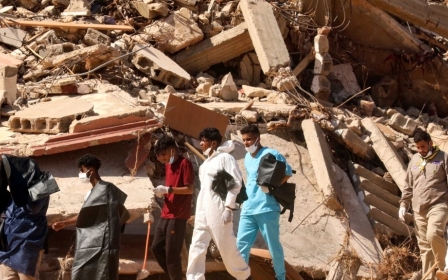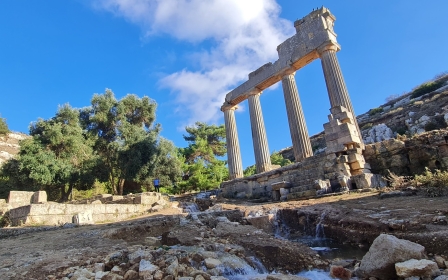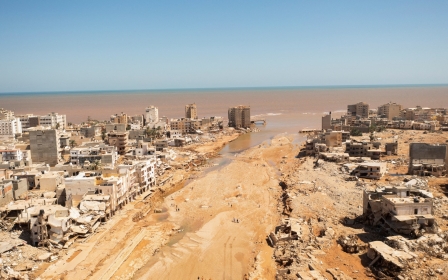Libya floods: Fears of epidemic grow as bodies decompose
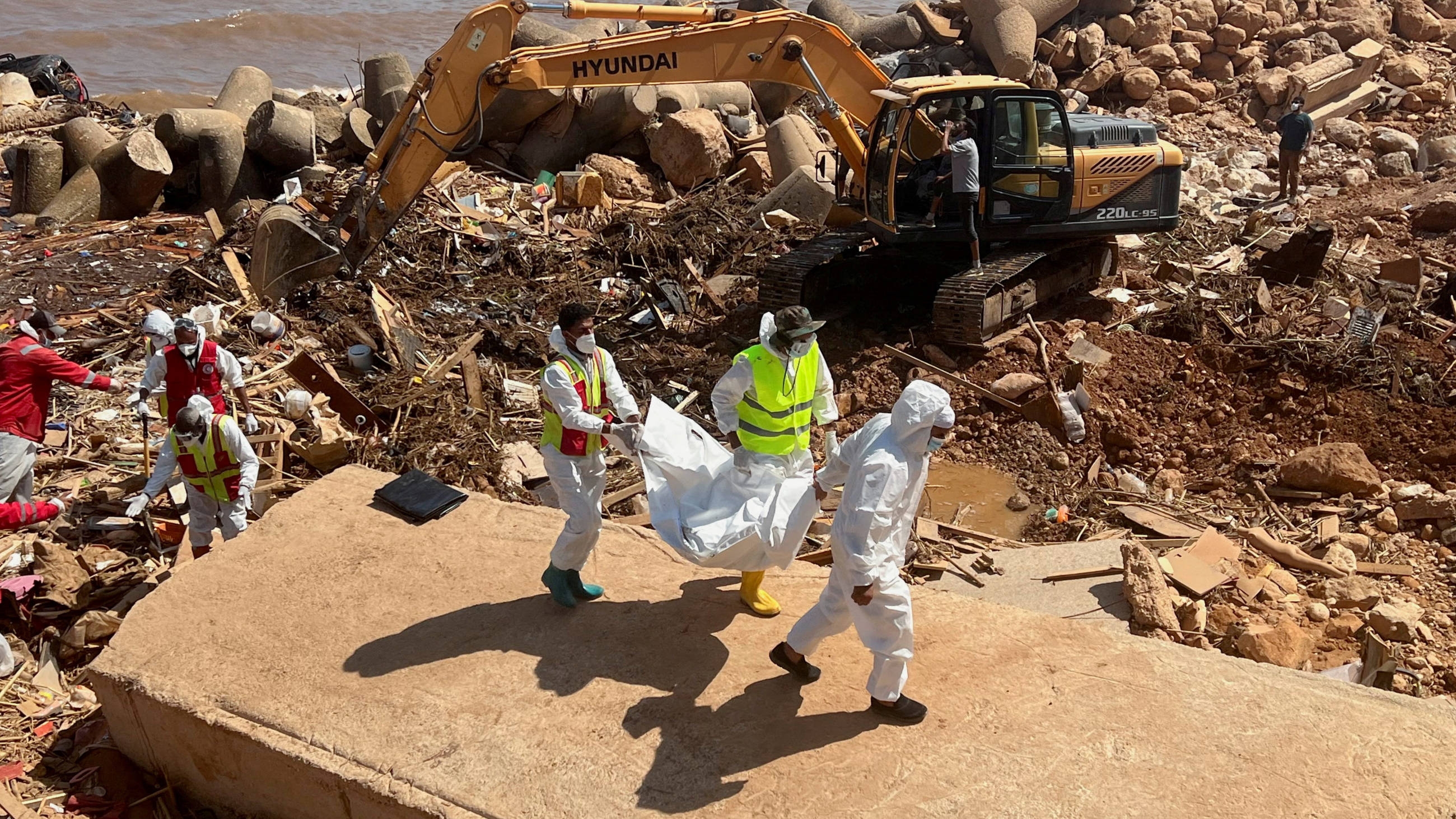
Aid workers and volunteers on the ground in Libya's Derna have raised concerns that the aftermath of the flash floods that ravaged the city could soon result in an epidemic.
Storm Daniel, a tropical storm that caused two dams to collapse unleashing floods, has so far claimed the lives of over 11,300 people and left 10,000 people missing in under one week.
Now, people on the ground are afraid that the lack of emergency aid and coordination will cause the spread of disease, which could escalate very quickly.
Volunteers and medical personnel on the ground have already started preparing for an outbreak of disease, but are facing difficulties.
Dr Haifa al-Sheiri, who is currently in Derna, said that the lack of sanitation and capacity to deal with the number of dead bodies could be catastrophic.
"It is expected an epidemic will happen due to decomposing bodies on land and those being washed up by the sea," she told Middle East Eye, highlighting that the disaster had taken in a very small city, making it easy for disease to spread, which, if not prevented, could lead to disastrous consequences.
A lack of clean running water and personal protective equipment, as well as body bags, also increase that risk.
"There is no food, drinking water, children's milk or medicine of any kind - even things such as painkillers or medicine for chronic illnesses," Sheiri said.
'It is expected an epidemic will happen due to the decomposing bodies on land and those being washed up by the sea'
- Haifa al-Sheiri, doctor
She added that the teams deployed on the ground also have limited supplies of protective masks and clothing.
According to Wael Habil, a volunteer and translator on the ground in Derna, measures have already been taken to prevent the spread of disease.
"Today and yesterday medical teams and volunteers were stopped from entering crisis zones over fears of an endemic," he told MEE.
"We have all assembled and are preparing to give aid while wearing gloves. We have sterilising alcohol and also have medical supplies," he added, explaining that they are awaiting instructions from the army before they enter the crisis zone.
'The sea dumping bodies'
Dr Mahmoud Boghzai, a healthcare manager, meanwhile, said that Covid-19-coveralls are available but that there is some difficulty in getting them to the right areas.
"We need people to get in contact with us and help us facilitate sending the overalls to the places where they are needed most," he said.
On Friday, Abdulmenam al-Ghaithim, the mayor of Derna, called for specialised teams to recover the dead bodies around the city.
"I fear that the city will be infected with an epidemic due to the large number of bodies under the rubble and in the water," he said.
Ali al-Ghazali, an activist on the ground, said that the worst-hit areas are some of the remote regions and villages.
"The most affected areas are places such as Bab Tobruk, Sahel and Shayha. There have been no evacuations or official announcement of an endemic yet, but if it does happen, these affected areas will be closed off," he told MEE.
With water in short supply and aid trickling in slowly, civilians are worried that even those offering help may spread diseases as they have limited access to sterilising equipment and limited change of clothes.
Earlier this week, Hichem Abu Chkiouat, the minister of civil aviation in the parallel administration that runs eastern Libya, said the "sea is constantly dumping dozens of bodies", which has become a cause of concern as people say they have started to decompose.
Documenting deaths
The World Health Organisation (WHO) and several other agencies called on Libyan authorities not to bury victims in mass graves after the UN found that over 1,000 had been buried as such.
"We urge authorities in communities touched by tragedy to not rush forward with mass burials or mass cremations," said WHO official Kazunobu Kojima on Friday, in a joint statement with the International Committee of the Red Cross and the International Federation of the Red Cross and Red Crescent Societies (IFRC).
'They spray the names of the dead on walls and photograph them so as not to forget'
- Activist
The statement said that burials should occur in well-demarcated and documented individual graves.
"An unnecessary rush to dispose of bodies of those killed in disasters or conflict deprives families of the opportunity to identify and mourn their loved ones while providing no public health benefit," said Gwen Eamer, IFRC's senior officer for public health in emergencies.
"Dignified treatment of the dead requires appropriate time to identify the deceased and mourn and perform funeral rites in accordance with local cultural and social norms."
According to one activist who spoke to MEE on condition of anonymity, there are currently no proper plans in place to count the fatalities, due to the scale of destruction.
"They spray numbers and the names of the dead on walls and photograph them so as not to forget, but there is no proper data entry or enough data collectors in the field right now," he said.
Middle East Eye propose une couverture et une analyse indépendantes et incomparables du Moyen-Orient, de l’Afrique du Nord et d’autres régions du monde. Pour en savoir plus sur la reprise de ce contenu et les frais qui s’appliquent, veuillez remplir ce formulaire [en anglais]. Pour en savoir plus sur MEE, cliquez ici [en anglais].


